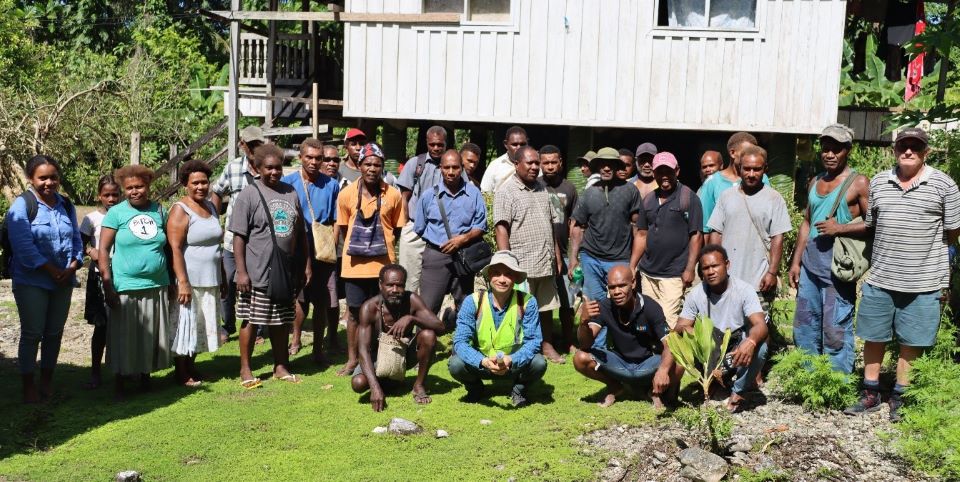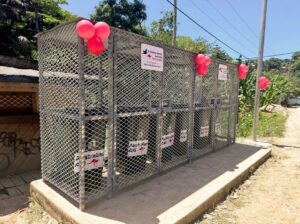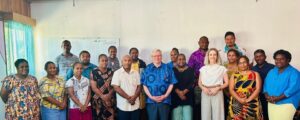A joint mission team from the World Bank and the Solomon Islands Government (SIG) have commended Agribusiness Producers Organizations (ABPOs) approved under the Solomon Islands Agriculture and Rural Transformation (SIART) grants in Malaita.
This was during the team’s visit to the province from September 18 to 21, 2024.
The team following the visit expressed their satisfaction with the farmers’ plans and practices, highlighting the positive impact of the grants on the rural communities.
The mission visited the Alisuri Sustainable Livelihood Association in West Mbaelelea, Green AG-Community Company Limited, and Taki Farmers Association in North Malaita.
These ABPOs had recently signed agreements under the SIART grant program. A cocoa Agribusiness Producers Organization near Mbitaama, which has had its proposal approved but needs to meet a few final requirements before signing its grant agreement, was also visited.
Additionally, the team explored the Wanenira piggery ABPO in Kakara, where members are raising crossbred pigs and seeking to expand their businesses.
During the visits, farmers expressed their gratitude for the high-level engagement, emphasizing the rarity of such visits.
One cocoa farmer commented, “We are truly honored by your visit today. It’s rare for high-level agricultural officers from the Government to come to our communities.”
The farmer noted that agricultural extension officers have not been able to visit regularly due to logistical challenges.
Grant Support and Training Opportunities
The mission team provided insights into how the SIART grant agreements would function.
“The grant will not only provide cash grants but also deliver the necessary training and tools for you to earn a decent living,” explained Son Thanh Vo, co-leader of the World Bank Agricultural Implementation Support Team.
He urged the farmers to fully utilize the knowledge and resources that will be provided under the grant.
William Okekini, SIART Agribusiness Officer, emphasized that the ABPO beneficiaries would receive agricultural technical training from the SIART Project Provincial Teams in the coming weeks, specifically targeting the crops and activities they are involved in.
Cocoa farmers, for instance, will receive training on cocoa management, including proper pruning techniques and grafting to boost yields.
Green AG-Community Company Limited member, William Abuinao, shared how his group has relied on cocoa farming for generations, cultivating 30 hectares of land.
However, individual farmers selling wet beans at lower prices prompted them to form an organization.
“As a group, we aim to acquire equipment for fermentation and driers and move to dried bean production, which will significantly increase our members’ incomes,” Abuinao said.
He also pointed out the need to adopt low-technology operational systems, such as solar dryers, to enhance production efficiency and quality.
“With solar dryers, we can produce high-quality dried beans and reduce our dependency on firewood and smoke-dried beans,” Abuinao added.
Peer-to-Peer Learning
The joint mission team praised the ABPOs’ initiative to incorporate peer-to-peer learning into their operations, where farmers share knowledge and best practices within the SIART grant support network.
Thanh Vo stressed the effectiveness of local farmers using their native languages to explain agricultural techniques to their peers, enabling a more practical and accessible transfer of knowledge.
The mission team concluded their visit by encouraging other ABPOs to learn from the successful practices of the grant recipients, particularly in utilizing profits as revolving funds to reinvest in their communities and expand their agricultural operations.
During the mission team’s visit to Solomon Islands, they also met with the Minister for Agriculture and Livestock, Honourable Franklyn Derek Wasi.
In his brief to the visiting mission team, Hon. Wasi thanked them for their funding support to MAL through the SIART project and said that, the people of Makira, Malaita and Guadalcanal provinces (the three target provinces) are very privileged to be selected as the sites for the SIART project.
Minister Wasi also highlighted to them the eight policy priorities for MAL under the Government for National Unity and Transformation (GNUT) and hopes to have an expanded scope of engagement with the World Bank in the near future going forward.
Source: MAL/SIART Media




